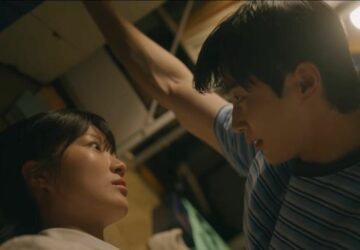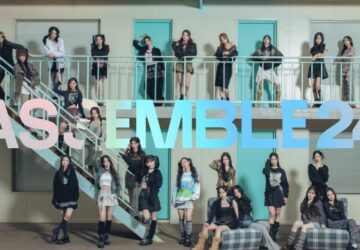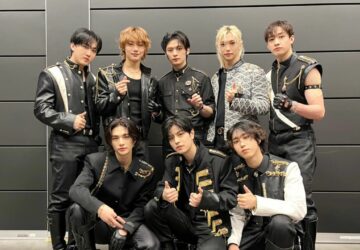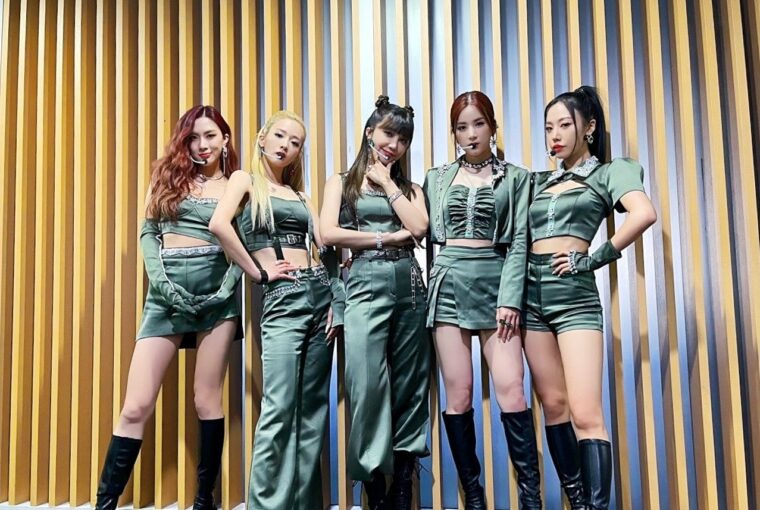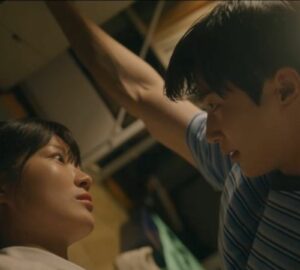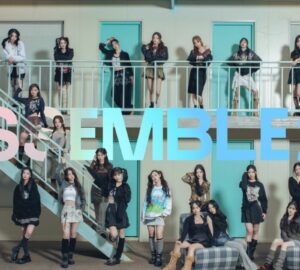If you are a K-pop fan, no matter which generation, chances are you have at the very least heard of Apink. Second-generation Kpop fans have witnessed the group’s steady rise to stardom and their longevity that has allowed them to get past the much-dreaded “7-year curse” that unfortunately, a lot of their contemporaries fell victim to. For the more recent generation of Kpop followers, Apink is synonymous with a group successfully accomplishing an image overhaul because these fans swear they could remember hearing Apink popularizing teenybopper songs only to see them mount once a year comebacks with rather sophisticated hits like Eung Eung, I’m So Sick, and Dumhdurum.
One of the only few remaining 2nd gen groups that continue to be active up to now, they have survived the 7-year curse, line-up changes, contract renewals, their entertainment company’s several name changes (yes, their company have changed their business name thrice in a span of eleven years), and concept changes. Dubbed as the “fairy idols of k-pop”, the group has stuck with a sweet and innocent image for most of their careers, only implementing major changes in recent years.
So, how is it that this relatively scandal-free, durable, and long-lasting girl group is suddenly sending tongues a-wagging after releasing a special album of their 10th year as a group in 2022 when they’re only two months shy from celebrating their 11th year? Here is a breakdown of Apink‘s 10-to-11 year saga in three acts.
Act One: The Age of Innocence
The year was 2011. The second generation of K-pop idols dominated the airwaves, with intense rivalries, defections, and contracts getting violated left and right. It was during this time when the Big 3 entertainment companies introduced idols that became iconic and built the foundation of what was to be at the time the biggest attack of the Hallyu wave not just in Korea but in Asian countries and even America. SM had TVXQ!, SHINee, Super Junior, f(x), and Girls’ Generation, while YG countered with BIGBANG and 2NE1, and not to be outdone, JYP promoted 2AM and 2PM, Wonder Girls, and had just also introduced Miss A.
i can't believe it's already 11th, i can still remember watching you from the television when i was a kid, that was apink news era. i've seen your growth and it's safe to say that y'all are my first love and my everything. i love you apink happy 11th anniversary💙🥰 @Apink_2011 pic.twitter.com/xuqH7MgvJ7
— chi 🐼 || semi-ia bcs of reqs 💻📚 (@hyejoolfie) April 18, 2022
There were groups that stood their ground and built huge followings as well — INFINITE, B2st, MBLAQ, Teen TopKara, SISTAR, Jewelry, T-ARA, After School, 4Minute, and Secret, to name a few. Considering that these groups didn’t have as secure a support machinery as the ones mentioned earlier, that means that their success was really a big deal. To survive the industry and rise into household name despite not having a giant entertainment label to back them and the intense competition with hundreds of new groups debuting with them, all hoping to avoid being “nugus“, is no easy feat at all. The groups mentioned earlier proved that it can be done. However, by this time, the k-pop scene was already starting to get saturated, so it would take a number of factors such as a great mix of members, a concept that would click with the masses, and songs that the public would enjoy to survive and eventually thrive at that time.
So, when Cube Entertainment toyed with the idea of producing a new girl group even with the ongoing success of B2st and 2Minute on their table, it could be said that they pulled a considerable number of stops to ensure the success of the group they will be introducing to the public. In February 2011, Cube Entertainment announced the first trainee for this new girl group, Son Naeun, who the public was already familiar due to B2st‘s Soom, Beautiful, and Niga Jeil Joha music videos in late 2010, followed by Park Chorong, who appeared at the end of B2st‘s Shock Japanese music video. She was immediately announced as the group’s leader. By this time, the company also announced that a special and autonomous subsidiary named A Cube has been established to focus on the development of this new group, to be known as Apink. They also announced the third member, Oh Hayoung, a rather tall and mature-looking trainee who apparently was going to debut as Apink‘s maknae while still in middle school.
Eunji, the main vocalist was later revealed to have been offered a vocal coach job with Cube before being considered as a member of Apink, which was why she had only been training for close to two months before the revelation. She was introduced as the fourth member on A Cube’s Twitter account through a video of her singing a rendition of Jennifer Hudson’s Love You I Do before Yookyung was similarly announced through an online video where she was playing the piano. The last two members, Bomi and Namjoo, were introduced through the group’s reality show, Apink News.
Apink News, a documentary detailing a lot of behind-the-scenes footage of the group’s creation and various training activities leading to their debut proved to be a stroke of genius. One, although the show was aired on a cable channel, the viewing public was very familiar with the celebrities who acted as hosts and MCs introducing the various videos and portions of the show — G.NA, Mario, MBLAQ‘s Seung Ho, and G.O, Beast, 4Minute, 2AM‘s Jinwoon, Secret’s Sunhwa and Hyosung. The viewers were also given a look at the intense preparations of the members before the group was launched, which made the members very relatable and familiar as even before they debuted. The viewers were already familiar with the strengths, weaknesses, and personality quirks of all seven members. Finally, a week before the group’s official debut, their first TV commercial for Ceylon Tea was released, so with all these pre-debut activities, the public was at the very least, vaguely familiar with Apink.
Alas, when Apink‘s debut EP, Seven Springs of Apink, and the music video for its lead single, Mollayo was released on April 19, 2011, there was not a lot of awkwardness associated with a new group being pushed to the public in a cold and direct manner. The Mollayo music video also definitely caught the attention of the B2st fandom as it featured Lee Gikwang. It Girl, their second single was promoted after a few months and an OST for the SBS drama Protect the Boss was also released in September.
The year ended with two big items: One, appearing on another reality show called Birth of a Family, where they shared top billing with Infinite, which at that time, was already getting more attention, and the other being the release of their second EP, Snow Pink, on November 22, which featured the Shinsandong Tiger-composed lead single My My. After seven months, the girls won a music show, a clear indication that a group has established a pretty sizable fanbase. After all, if a group doesn’t have fans who will stream the music video or vote for their song on the music show’s SMS platforms, getting a win will be that difficult, considering that a rookie group isn’t really expected to have sizeable sales figures or high chart positions, which are also included in the criteria of music shows.
With four rookie of the year awards in their belt, Apink did prove that they are a group to be reckoned with. And considering that the group debuted with a sweet and teenybopper image with their first two EPs, their successful debut year is quite a feat and upon closer inspection, very well-thought of. The innocent music which was their introduction to the public is a bit too reminiscent of the music of 1st generation of girl groups like Baby V.O.X, Fin. KL and SES. Also considering that the groups at that time were going more for the range of girl-next-door with a notch of sophistication (SNSD) to downright sexy and adult (Secret and Nine Muses) to cater to changing public preferences, Apink‘s sweet and innocent concept may be a blessing in disguise.
While it is true that what the public liked at that time may be a bit distant from the lollipops and rainbows concept the group is offering, they practically cornered the market. None of their contemporaries offered childlike innocence the way Apink did. SNSD at that time was already moving closer to sophistication with releases like Run Devil Run, Hoot, and The Boys. Consider this: the music video of Mollayo had the girls nursing a guy who passed out in front of their front door into their house. But no, instead of shouting “STRANGER DANGER” at the top of their lungs, the girls get giddy and shy when the said guy (Gikwang in a baby blue suit) does even the smallest of things like passing a glance. How’s that for cringy but endearing because the girls just sold the concept so hard and so effectively, you can’t help but think of what gift they should give Mr. Stranger once he recovers his strength. Spoiler: Naeun gave him flowers she herself picked, Hayoung gave him a cookie, and Eunji gave him a bookmark.
And that may hold a couple of the major keys to Apink‘s success years after debuting. The girls continued with tracks like Bubibu, Hush, and NoNoNo, which have wholesomeness written all over them. The songs cover rather simple topics of what you would like to do with someone you like and the dilemma of whether to confess what you feel to the person. Very grade school stuff, which until this point is trademark Apink. You just cannot picture f(x)‘s Amber, 2NE1‘s Dara, or even SNSD‘s maknae Seohyun saying, “Dear boy, I fell in love with you on a snowy day” (Yookyung’s lyrics in My My) or the queens of retro T-Ara singing, “I wanna be that girl who can be with you forever, so tell me, will you be my boyfriend?” (again, spoken by Yookyung — I swear, Yookyung has some of the most cringe-inducing lyrics in the entire history of k-pop).
This brings us to the second point: which was mentioned already earlier: All seven, and later, six, members of the group are masters, legends, and icons, in selling to us the sweet and pure concept of the group. Imagine these scenarios:
- Being a singer in her early 20’s like Chorong and having to sing the syllables BU-BI-BU. What on earth does that even mean? But of course, it’s baby talk and the seven in all their aegyo prowess, has us believing in what they are singing.
- Poor Yookyung having to say those cringe-y lyrics, reminiscent of grade school students daring each other to give the other their first kiss.
- The entire group wearing white skintight pants and baby tees – an attire that just does not adhere to anyone’s standards of innocence, for the Hush music video, and still having to act cutesy and perky in scenes where they are playing with the camera.
If you are a singer in your late teens, the last thing you want to be is to appear like a grade school student, singing lyrics like “I’m always trembling, I think of you every day, You don’t know my feelings for you is getting larger.” Granted that this stanza was sung by Hayoung, who was indeed a middle school student the time Mollayo was released, but for someone who at that time, already looks like a graduating university senior, it’s not supposed to work. But Apink‘s giant maknae has a whole deck of tricks up her sleeve and used it for most of the group’s career, we all fell for it. So you could imagine how Hayoung may have reacted when she first heard I’m So Sick, which references insincere lovers and drunk episodes. But I’m fast-forwarding.
There’s also Eunji’s voice, which by now, we know is not her natural timbre. Seriously, can you hear her singing Mollayo in the same voice she uses for her latest solo single, AWay? But then, that’s just a testament to her mad vocal skills and technique – that she knows how to adjust the color and “weight” of her voice to suit the entire Apink discography.
In short, these girls worked their derrieres off in selling the group’s pure and innocent concept to the entire k-pop listening public, and the said public ate it all up, no morsel left behind. I mean, we’ve heard of several stories involving idols complaining about the concepts their companies may require them to do. Some idols do not agree with the image they have to embody, while some put their feet down and speak up about inappropriate wardrobe choices. When you think about it, by their second year, Apink could have already forwarded concerns regarding their concept. But it’s either nothing was heard from them or A Cube (or the members themselves) was just very good in hiding any dissent. The point is, that pure and innocent concept stuck and stayed there until 2019.
After NoNoNo came more success, which some consider as Apink’s first “golden streak.” By 2014, Apink was down to six, with Yookyung deciding to pursue her studies than staying with the group. After the success of NoNoNo, which became their biggest hit up until that time, they released their fourth EP, Pink Blossom, and the music video for its title track, Mr. Chu, were released on March 31. The song peaked at number 2 on Billboard’s K-Pop Hot 100 and gave Apink six music show trophies. By the end of 2014, Mr. Chu was the eighth best-selling digital song of the year, according to Gaon’s year-end chart. 2014 also saw Bomi and Namjoo forming a sub-unit called Apink BnN, which released the single My Darling for Brave Brothers’ 10th Anniversary Project.
Reminds me of GOT7 covering Apink's "Mr. Chu" https://t.co/Ewm5taa8P8
— mahita🥀A Wild Rose💚🔗💙 (@ahgase_elf) April 19, 2022
The year also saw the group debuting in Japan with the Japanese version of NoNoNo, which peaked at number 4 on Oricon’s weekly singles chart. Before the year ended, the group released their fifth EP, Pink Luv with its title song, Luv, which was another Shinsadong Tiger track. Luv dislodged NoNoNo as Apink‘s highest-ranking song as it became their first number 1 on Gaon’s weekly and monthly digital charts, while Pink Luv also topped Gaon’s weekly album chart in its first week of release. The group won first place on all three major Korean music shows two weeks in a row, the only girl group to do so in 2014. The song ended up giving Apink 17 music show wins, which up to this day holds the record for the song with the most wins for a girl group. Only Psy, BTS, and EXO have surpassed this feat, and with GFriend already disbanded and Girls’ Generation not promoting as much anymore, this record is not seen to be broken in the near future.
The group’s success continued with the release of Remember in 2015 and somewhat a lukewarm (by Apink’s standards) of their 2016 comeback Pink Revolution with the lead track Only One. After the successes of NoNoNo, Mr. Chu, and LUV, the performance of Only One in the charts, where it peaked at number 5 and sold over 449,000 copies is underwhelming, though still quite commendable in girl group standards. After the record-breaking 17 music show wins for LUV and a respectable three trophies for Remember, Only One won zilch.
Some blame the timing of the release as it coincided with more hyped releases like GOT7. Moreover, Pink Revolution was released more than a year (14 months to be exact) after Pink Memory, and even during that time, when the this behavior of long hiatuses between releases is only expected of groups that have already established themselves in the industry like Shinhwa, it felt like Apink was already resting on their laurels and not working as hard as groups of their stature should be. Even with The Wave being released to commemorate their fifth anniversary on April 19 to supposedly tide Pink Pandas over until Pink Revolution’s release (plus the fact that The Wave up to now continues to be one the best fan service songs in the history of K-pop, without question), the long gap between those two releases did not sit well with the fandom.
Finally, it has to be said that the song was not really something that should have silenced those who waited for the group to break their hiatus. I mean, if you have to wait for more than a year for your favorite group to stage a comeback, you somehow expect them to drop a banger, a showstopper to silence the doubters and announce their return to the entire K-pop world, in the same vein when people go crazy when they heard whispers of “Shinee’s back” or “JYP” after a long stretch. Only One did not create this tidal wave people expected; instead, it made a tiny splash with its mellow sounds and its music video filled with dreamy and hazy pastel filters. While the girls claimed in their comeback interviews that the Pink Revolution album and Only One, in particular, signaled a shift in the musical direction of the group from bubblegum pop to a more elegant and sophisticated sound, it was just not an exciting song to represent this change. After all, change should be exciting, right? So, if you’re telling people that you will be implementing changes, at the level of Apink’s popularity, they may have expected something more remarkable, fancier, pronounced – something splashier, perhaps? What they got with the Only One comeback, was, unfortunately, something closer to a whimper.
With this less-than-stellar comeback – again, by Apink standards, considering that at this point in their careers, they were already up there in the top tier with SNSD, 2NE1, Wonder Girls, Miss A, SISTAR, 4Minute, Apink figured for their next move to remind people of their heyday by bringing back the chirpy, cutesy sounds reminiscent of 1st gen girl groups (which served as their bread and butter before the boring half-baked image change of the Pink Revolution era). And Five delivered on that, and how. Pink Up the EP and Five the song gave us vintage Apink, old school Apink, the Apink that won 17 music show awards, the Apink with a song that once you’ve heard it, will stay with you for weeks. Song with a catchy earworm chorus, check. A music video drenched in bright pink and the six engaged in cute and fun activities such as gardening and anything to do with pastries (very reminiscent of the NoNoNo, My My and Remember music videos), check. Bomi looking like a children’s anime character with the short blonde hair, check. Apink’s back, Pink Up the EP peaked at #1 in the Gaon charts, Five won six music show trophies, and all that is good and wholesome in the world has ben restored.
With Apink back to top tier level after the Pink Revolution debauchery, the talk was all about one thing: survival. Apink has successfully gotten past the seven-year curse that has unfortunately sent their contemporaries on the road to disbandment or hiatus. By 2017, SISTAR and 2NE1 have officially disbanded, while Girl’s Day, After School and f(x) have left their fans out in the cold, constantly assuring them that they have not disbanded but not releasing new material. For Apink, the concerns were more about how they could bring their glory days back than keeping their group intact.
For some reason, there wasn’t really much speculation about a member wanting to leave the group. While it is true that some groups can pull surprises (e.g., Hoya and his sudden exit from Infinite when everybody was quite sure that if anyone would depart from Infinite, it was going to be rising actor L), the case of Apink members leaving wasn’t really thoroughly considered. True, Naeun, may at times stick out as a sore thumb because of her rather reserved nature which doesn’t at all times mesh well with the chaotic energy levels of Bomi and Namjoo, but then we tend to forget that Chorong is also introverted. People also believed that with her versatility as a vocalist and success in acting, it was Eunji who may be considering a solo career, but the group’s main vocal has never given any indication that she was going to be the one to succumb to the 7-year curse and leave Apink. So, when news came out that all members re-signed to their company (which at that time was already renamed Plan A, I think) and they all revealed that they have put their trust in their leader Chorong and continued with the group, everyone rejoiced. And to commemorate their re-signing, they released Five and brought us back to 2011.
And this also ends the first act of Apink’s saga.
Featured Image: Apink Official Twitter

